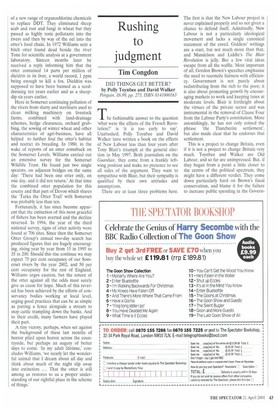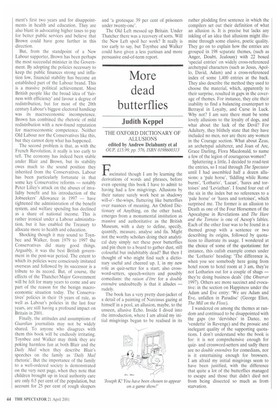Rushing to judgment
Tim Congdon
DID THINGS GET BETTER? by Polly Toynbee and David Walker Penguin, £6.99, pp. 273, ISBN 0141000163 The fashionable answer to the question 'what were the effects of the French Revolution?' is 'it is too early to say'. Unabashed, Polly Toynbee and David Walker have written a book on the effects of New Labour less than four years after Tony Blair's triumph at the general election in May 1997. Both journalists on the Guardian, they come from a frankly leftwing position and make no pretence to see all sides of the argument. They want to sympathise with Blair, but their sympathy is qualified by their own attitudes and assumptions.
There are at least three problems here.
The first is that the New Labour project is never explained properly and so not given a chance to defend itself. Admittedly, New Labour is not a particularly ideological movement and lacks a single canonical statement of the creed. Giddens' writings are a start, but not much more than that, and Mande!son and Liddle's The Blair Revolution is jelly. But a few vital ideas escape from all the waffle. Most important of all, Gordon Brown's speeches emphasise the need to reconcile fairness with efficiency. Government is not purely about redistributing from the rich to the poor; it is also about promoting growth by encouraging markets to work and keeping taxes at moderate levels. Blair is forthright about the virtues of the private sector and was instrumental in the removal of Clause Four from the Labour Party's constitution. More astonishingly, he has not only coined the phrase 'the Thatcherite settlement', but also made clear that he endorses that settlement.
This is a project to change Britain, even if it is not a project to change Britain very much. Toynbee and Walker are Old Labour, and so far are unimpressed. But, if they began from a point a little closer to the centre of the political spectrum, they might have a different verdict. They come down particularly hard on Brown's fiscal conservatism, and blame it for the failure to increase public spending in the Govern ment's first two years and for disappointments in health and education. They are also blunt in advocating higher taxes to pay for better public services and believe that Brown could have gone further in this direction.
But, from the standpoint of a New Labour supporter, Brown has been perhaps the most successful minister in the Government. By adopting the policies necessary to keep the public finances strong and inflation low, financial stability has become an established part of the Labour brand. This is a massive political achievement. Most British people like the broad idea of 'fairness with efficiency' and favour a degree of redistribution, but for most of the 20th century Labour's biggest electoral handicap was its macroeconomic incompetence. Brown has combined the rhetoric of mild redistribution with a new-found reputation for macroeconomic competence. Neither Old Labour nor the Conservatives like this, but they cannot deny what has happened.
The second problem is that, as with the French Revolution, it really is too early to tell. The economy has indeed been stable under Blair and Brown, but its stability owes much to the sound position they inherited from the Conservatives. Labour has been particularly fortunate in that some key Conservative reforms — notably Peter Litley's attack on the abuses of invalidity benefit and his introduction of the Jobseekers' Allowance in 1997 — have tightened the administration of the benefit system, and welfare spending has declined as a share of national income. This is rather ironical under a Labour administration, but it has enabled the Treasury to allocate more to health and education.
Shocking though it may sound to Toynbee and Walker, from 1979 to 1997 the Conservatives did many good things. Arguably, it was the best British government in the post-war period. The extent to which its policies were consciously imitated overseas and followed by its successor is a tribute to its record. But, of course, the effects of the Thatcher/Major Government will be felt for many years to come and are part of the reason for the benign macroeconomic situation today. The Conservatives' policies in their 18 years of rule, as well as Labour's policies in the last four years, are still having a profound impact on Britain in 2001.
Finally, the attitudes and assumptions of Guardian journalists may not be widely shared. To anyone who disagrees with them this book will be endlessly irritating. Toynbee and Walker may think they are poking harmless fun at both Blair and the Daily Mail when they describe Blair's speeches on the family as 'Daily Mail rhetoric'. But the importance of the family to a well-ordered society is demonstrated on the very next page, when they note that children brought up in local authority care are only 0.5 per cent of the population, but account for 25 per cent of rough sleepers and 'a grotesque 39 per cent of prisoners under twenty-one'.
The Old Left messed up Britain. Under Thatcher there was a recovery of sorts. Will the New Left spoil her work? It really is too early to say, but Toynbee and Walker could have given a less partisan and more persuasive end-of-term report.



































































 Previous page
Previous page